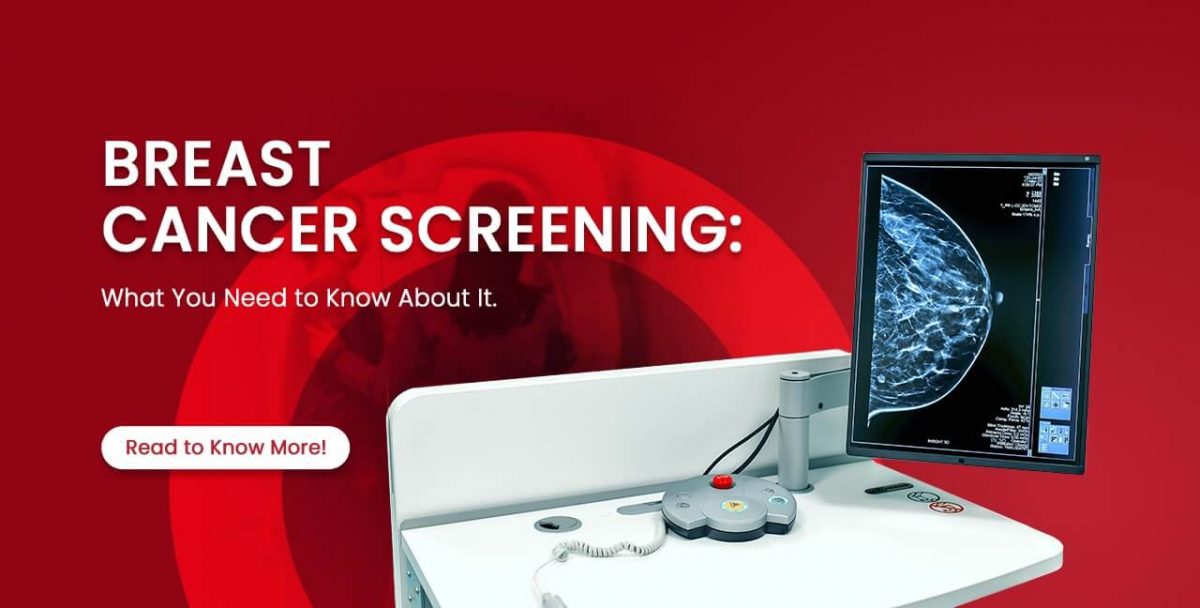Breast Cancer Screening: What You Need to Know

Your health is greatly impacted by early detection and screening for breast cancer. Screenings can detect breast cancer in its early stages and increase the chance of treatment and survival. Learning about breast cancer screening tests and the significance of early breast cancer diagnosis can help you take control of your life ahead.
One of the basic diagnosis of breast cancer is the physical examination. Your doctor performs a clinical breast exam to check for lumps or other abnormalities. It is an integral component of your routine checkup. The physical diagnosis also involves checking the underarm and collarbone regions. If they find any suspicious lumps, they could advise additional tests.
Here’s everything that you need to know whether you’re about to receive your first screening mammogram or want to know more about follow-up tests after an abnormal finding.
Breast Cancer Screening Tests
Mammograms
A mammogram involves an X-ray of the breasts. This process is known as mammography. This process is a highly effective one and it can detect breast lumps years before they can be physically noticed. A variety of tests can help identify whether a lump might be cancer. Cancerous ones typically have different physical characteristics than non-cancerous ones. Mammograms and ultrasounds are imaging examinations that can easily detect this critical difference. Microcalcifications, which are minute calcium deposits that can occasionally signal the existence of breast cancer, can also be found during screening mammography.
Mammograms can accurately detect and give alerts about breast cancer following the discovery of a lump or another indication or symptom. This kind of mammography is called diagnostic mammography. Diagnostic mammograms are a great way of getting a clear evaluation when normal screening mammography becomes challenging due to breast implants. A diagnostic mammogram can also be performed to assess alterations discovered during a screening mammogram or to see breast tissue.
Breast Ultrasound
Breast ultrasound is a diagnostic procedure that creates images of your breast’s interior using sound waves. Your body’s surfaces act as resonators for the sound waves, and the echoes are captured on film or in still images. This is a completely painless procedure and is usually performed on pregnant women who shouldn’t be exposed to X-rays from mammograms.
It’s frequently used as a follow-up test following an abnormal mammography or clinical breast exam result. It can distinguish between a cyst that is liquid-filled and a solid mass.
Breast MRI
This test creates a detailed image of your breast by fusing many photos of it into one. Although it’s more frequently combined with mammography as a screening test to determine how far cancer has progressed after a diagnosis. Your doctor may do so if you’re younger than 25, pregnant or your breast tissue is too dense for mammography.
Biopsy
A biopsy is performed if further testing shows breast cancer is not ruled out. In a biopsy, cells or tissue are removed to look for cancer chances. It is the only test that can both detect and confirm breast cancer.
Age Recommendations for Breast Cancer Diagnosis
- 45 to 54: Schedule annual mammograms.
- Older than 55: can continue having yearly mammograms or switch to getting them every other year.
- 40 to 44: Starting yearly mammography is okay.
Breast Cancer Screening Advantages
As with any other screening method or intervention, there are risks and advantages to breast cancer screening. Each patient should go through a risk assessment to identify the best imaging approach, including the type of imaging to perform and the interval in which to have it performed.
Breast cancer risk assessment gives medical professionals the chance to pinpoint healthy women who have a greater than average risk of developing breast cancer and tailor their screening schedule accordingly. This is a great opportunity to promote lifestyle changes that will lower the risk of breast cancer and enhance general health.

 Call-an-Ambulance
Call-an-Ambulance



